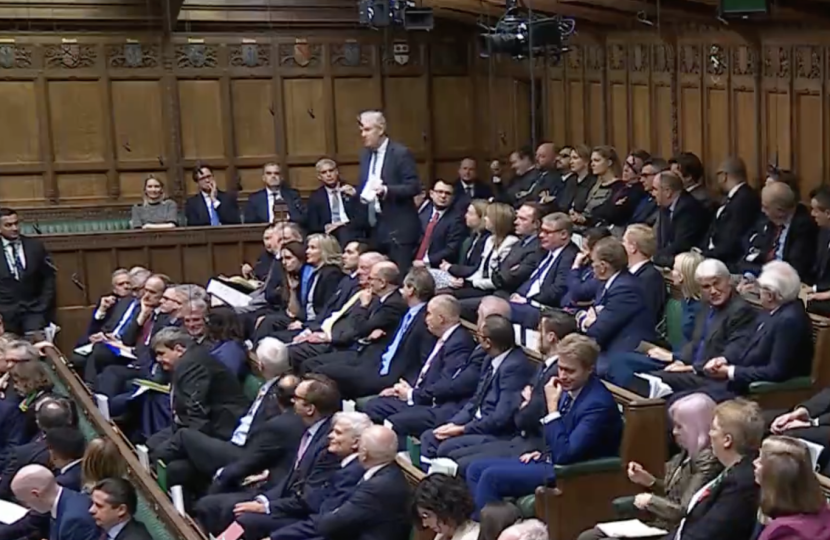
Today I voted against the Second Reading of the Terminally Ill Adults (End of Life) Bill that allows for assisted dying in specific circumstances.
Hundreds of constituents contacted me on both sides of this debate, and I am grateful for their engagement on such an emotionally fraught and complex issue. I also listened carefully to the many thoughtful contributions made by MPs in the Chamber today.
Ultimately, however, I did not feel I could vote for the Bill in good conscience. What unites us all is a desire not to see people suffer. But it is not enough to rely on that sentiment. To translate an understandable desire to avoid people suffering into workable legislation that protects the most vulnerable is a very difficult thing to do. It requires robust, thorough scrutiny and extensive public debate.
Having examined the Bill, I have several reservations which will not be resolved simply by the Private Member’s Bill being given a committee stage (a concession that was offered today by the Bill’s proponents).
I paste below the reply I have sent constituents to set out some of those reservations, and I did not hear sufficient reassurances on these points today to warrant a change of position.
Correspondence to Residents
“Thank you for contacting me about assisted dying.
I have been in touch with many residents in recent months to set out my thoughts on this issue. When I shared my position previously, the Bill had not been published so I could only provide my broad thoughts, which I summarise below:-
- I am open to assisted dying as a principle because I appreciate why someone would not want to go through severe pain and illness, or might want to help a loved one avoid such a fate.
- I believe the first duty of the state is to provide security to the individual, including protecting the most vulnerable. I have always been concerned about assisted dying morphing from a right to die to some feeling under a duty to die. I also worry about the strength of any safeguards.
- This debate is not just about principle but about practice and the very real challenges of creating a working regime.
- I am very worried about scope creep. This stems from my experience as a legislator with the ways in which MPs and campaigners have sought to change abortion law with little scrutiny.
On 12 November, the details of Kim Leadbetter MP’s Terminally Ill Adults (End of Life) Bill, were published and I have decided I cannot in good conscience support this legislation at its Second Reading.
This is because:
- A Private Member’s Bill is not the right vehicle for a law change of this magnitude. In wanting to honour a commitment he gave Esther Rantzen, the Prime Minister has given government backing to this Bill rather than allocating proper government time to it through his own legislative programme. This means debate is confined to five hours - not long enough, in my view, to scrutinise something so important. There is a very useful thread on X by Nikki da Costa, Former Director of Legislative Affairs in No 10, which provides more detail on why Private Member’s Bills are less robust that government Bills - https://x.com/nmdacosta/status/1857033763881935110
- The Bill approves assisted dying for patients whose deaths can reasonably be expected within six months. This is a very difficult qualifying criteria for doctors to get right.
- Applications for assisted dying have to go through the High Court and I do not believe sufficient assessment has been made of the impact. Too often, we in parliament pass laws without consideration to their practical enforcement and the kind of regime that will be set up to see through the law’s intent. There are only eighteen judges in the High Court’s Family Division, and they would likely each have to take on hundreds of these cases a year without considering the impact on their existing caseload.
- The Bill includes no detail on the type of drug that should be administered to end a life. In existing regimes, there are different experiences of assisted dying and some medications have led to long and distressing deaths. There is no requirement to record information about the death, such as its duration or any complications, and no duty for a coroner to investigate an assisted death.
- There is nothing to rule out in the Bill the ability of doctors to suggest assisted suicide. I believe this subject should only be discussed at the instigation of the patient.
- A patient can give their consent by proxy if they are unable to read, physically unable or ‘for any other reason’ - I think this is far too wide a scope and is open to abuse.
- The Secretary of State is duty bound to make sure that assisted suicide is available. A number of people have raised concerns about the NHS’s capacity adequately to deliver high quality palliative care let alone implement a safe assisted dying regime. Furthermore, the current Secretary of State opposes assisted dying.
- Sign off for an assisted death can only be done by two doctors, but the first doctor is able to choose the second, 'independent’ doctor.
This is the fundamental challenge with assisted dying. I entirely understand why people seek a way to avoid the pain and indignity of a long and difficult death, and as I have mentioned to previous correspondents, I have guided a loved one through such a death from terminal illness in the last few years.
However, I do not believe this legislation, in its current form, is the right answer and I fear it is being rushed through in a way that does not allay my concerns about the practical challenges of moving from principle into workable reality.
Residents have sent me hundreds, if not thousands, of emails and letters on this subject and I remain grateful for the level of engagement and the experiences that have been shared. I thank you again for writing to me.
With best wishes,
Julia”

